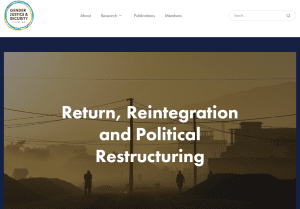Return, Reintergration and Political Restructuring
 Previous research on return migration has mainly covered return to political and economically stable countries. Furthermore, the literature predominantly focusses on economic reasons for return. Much less is known about the gendered experience of return migration to conflict-affected contexts, and how this relates to development, gender equality, justice and inclusive peace. This research project explores and analyses the gender experiences of returnees (forced and voluntary) in Afghanistan, Kurdistan, Pakistan and Sri Lanka. It reviews return policies of the countries under study to understand the possibilities, challenges and obstacles for returnees in the process of participating in re-construction in Afghanistan, Kurdistan, Pakistan and Sri Lanka through their human, social and cultural capital. The project used a mixed methods ethnographic design including surveys and structured interviews with a total of 679 migrant participants with diverse levels of education, different destination countries, occupations, ages, and genders. In the Afghan context, this research was conducted in Kabul and Kandahar before the return of the Taliban in 2021, making it some of the last data gathered by researchers in country pre-Taliban.
Previous research on return migration has mainly covered return to political and economically stable countries. Furthermore, the literature predominantly focusses on economic reasons for return. Much less is known about the gendered experience of return migration to conflict-affected contexts, and how this relates to development, gender equality, justice and inclusive peace. This research project explores and analyses the gender experiences of returnees (forced and voluntary) in Afghanistan, Kurdistan, Pakistan and Sri Lanka. It reviews return policies of the countries under study to understand the possibilities, challenges and obstacles for returnees in the process of participating in re-construction in Afghanistan, Kurdistan, Pakistan and Sri Lanka through their human, social and cultural capital. The project used a mixed methods ethnographic design including surveys and structured interviews with a total of 679 migrant participants with diverse levels of education, different destination countries, occupations, ages, and genders. In the Afghan context, this research was conducted in Kabul and Kandahar before the return of the Taliban in 2021, making it some of the last data gathered by researchers in country pre-Taliban.